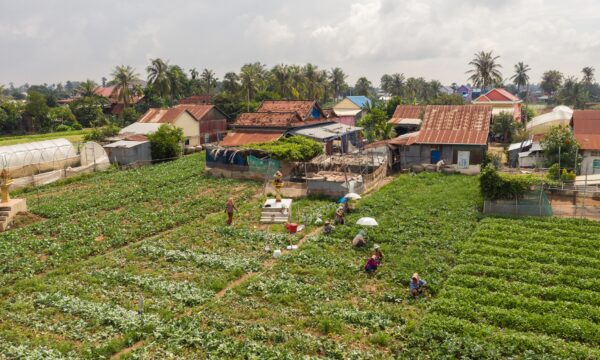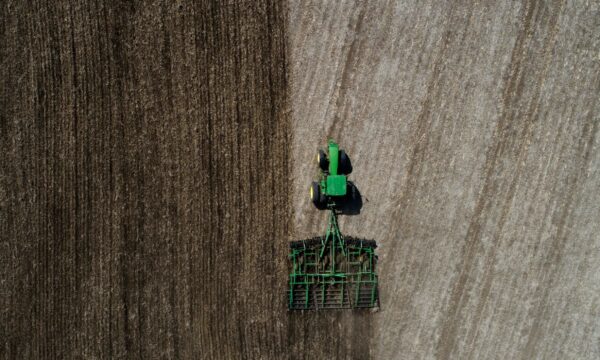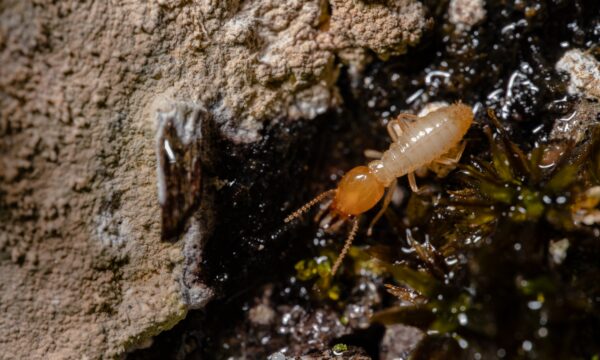
Women harvesting Moringa leaves, Burkina Faso. Photo credit: Pierre-François Pret
This is the second guest post as part of our Climate Smart Agriculture Week (20 – 24 November 2017)
Climate change poses major challenges to small-scale African farmers, whose own locally developed strategies to address these challenges provide entry points to sustainable processes of adapting to climate change. Partners in Prolinnova – a global network for promoting local innovation in ecological agriculture and natural resource management – have studied how crop farmers respond creatively to change.
Some case studies from West and Central Africa provide some insight:
-
- Farmers in Mali observed more frequent and extensive invasions of their cereal and vegetable crops by various pests, which compromised their food security and especially the financial autonomy of women. Their response was to collect and grind a local plant called potokolonibo and to apply its extract to the crops to control the pests. The locally produced potokolonibo-based biopesticide proved to be effective and has been adopted by several women tomato growers, whose crop yields and incomes have improved greatly as a result. Similar initiatives were observed in Burkina Faso and Cameroon, where men and women innovators developed new ways of controlling pests in vegetable farming and found new seed-bed materials that favor rapid seed germination and optimal seedling growth in the nursery.
-
- In northern Burkina Faso, some women heard about the benefits of the Moringa tree (Moringa oleifera) during a radio program and decided to cultivate near their wells a few seedlings that they received from the local environment office. These trees grew well and after a year the women of Zindiguessé village, Gourcy District, Zondama Province were able to harvest enough moringa leaves to make nutritious sauces for their families’ meals. Other women, who were previously skeptical, joined the first innovators and, as part of a group called Songre-la-panga, set up a village garden combining Moringa and Baobab (Adansonia digitata) trees covering an area of 1250 square meters so as to improve their households’ food security. To date, this garden is the only village green space where women can grow vegetables in all seasons.The marketing of Moringa and Baobab leaves generates significant revenues that are used to build a support fund for Songre-la-panga group members so they can obtain credit for their income-generating activities or to solve urgent problems. The group intends to engage in the processing of Moringa to add value to their production. The positive outcomes at this food production site led, in three years, to the creation of a second site.
-
- Naginpoan, a woman from a small farming community in Yendi Municipality, northern Ghana, innovated in the agro-food processing sector for food and nutrition security. Naginpoan’s household, whose sole source of income was the sale of crop surpluses, would often face hunger and malnutrition among her children in years of poor yields due to bad rainfall.
Four years ago, Naginpoan developed a new dish of wasawasa (traditionally made with yam) based on powder from the dawadawa fruit (Parkia biglobosa) mixed with maize flour. The mixture is steamed for 10 minutes and then oil and pepper are added for a delicious meal served with stew or “shitto” (hot sauce) for lunch. The yellow dawadawa powder is locally known to be rich in vitamin A and thus enriches the nutrient content of all foods to which it is added.
This yellow wasawasa has become very popular and much appreciated by local people, especially children. Naginpoan took advantage of the growing demand for the food, which she prepares and sells in the local primary school and on the weekly community market.She now earns daily an average income of 250 Ghana Cedis (about US$ 50) from her new business. As the development of this business increased Naginpoan’s need for wage labor, she hired three women to work with her. Beyond the alternative source of income that it provides, the yellow wasawasa improves the nutritional intake of her children, who eat this food almost daily. The dawadawa powder, which was little consumed in the recent past in local communities, has gained in popularity, as has the dawadawa tree itself, which is now highly regarded. The innovation is being adopted by several other women who have been trained by Naginpoan, and this promotes a better preservation of the species through local agroforestry practices.
- Naginpoan, a woman from a small farming community in Yendi Municipality, northern Ghana, innovated in the agro-food processing sector for food and nutrition security. Naginpoan’s household, whose sole source of income was the sale of crop surpluses, would often face hunger and malnutrition among her children in years of poor yields due to bad rainfall.
Such local innovations observed by Prolinnova partners across West and Central Africa serve as entry points for joint farmer-led research – a process in which formal researchers and extension workers join with farmers to participate in further developing their local innovations, integrating both local and scientific knowledge. This research and development approach emphasises the local creativity of farmers, who have often been regarded by others only as recipients of climate-smart innovations, not as innovators themselves.
The farmer-led research process begins with questions from the farmers themselves. For example, women producers of biopesticides from Mali, Burkina Faso and Senegal asked what dosages of local ingredients could give optimal results in controlling legume pests. In Ghana, Naginpoan – faced with the scarcity and the rising price of dawadawa powder at certain times of the year – asked about the possibility of using other proportions of the main ingredients and even introducing the powder/extract of bean leaves as protein, without altering the taste and nutritional quality of her product.
The Prolinnova approach creates relationships of mutual trust between actors along the research and development chain. Farmers involved gain self-confidence and are better able to take control in seeking solutions to their problems and in local development. This process strengthens the adaptive capacities of communities to respond to environmental and other changes.
The local people involved are better able to analyse their situation, to compare and synthesise their ideas and knowledge, to pool their energies and to collaborate with outside actors who can contribute to the local dynamics of finding easily accessible and cost-effective solutions to local problems. Ultimately, innovative communities become more resilient to shocks and stresses in an environment that is becoming increasingly uncertain.
Written by Georges Djohy, Subregional Coordinator for the West and Central Africa Prolinnova Platform (WeCAPP) (gdjohy@gmail.com). With a background as an agricultural engineer and anthropologist he encourages farmer creativity in using local resources in new ways. He backstops Country Platforms in promoting local innovation and policy dialogue at national and subregional levels to institutionalize participatory innovation development.
Field data provided by Prolinnova partners (Bangali Siaka and Do Christophe Ouattara in Burkina Faso, Jean Bosco Etoa and Armelle Sylvie Kaptchouang Djeumi in Cameroon, Joseph Nchor and Abubakari Mohammed in Ghana, Djibril Diarra and Assétou Kanouté in Mali, and Djibril Thiam and Assane Guèye in Senegal).
Views and opinions expressed here do not necessarily reflect those of Plantwise or CABI
Related News & Blogs
5 common chilli pests and diseases
Chilli pests and diseases can considerably impact crop production. Not only can pest and disease outbreaks lead to severe yield losses, but they also reduce quality and lower market value. In many countries, including India, Bangladesh, Malawi, and Tha…
12 June 2025




